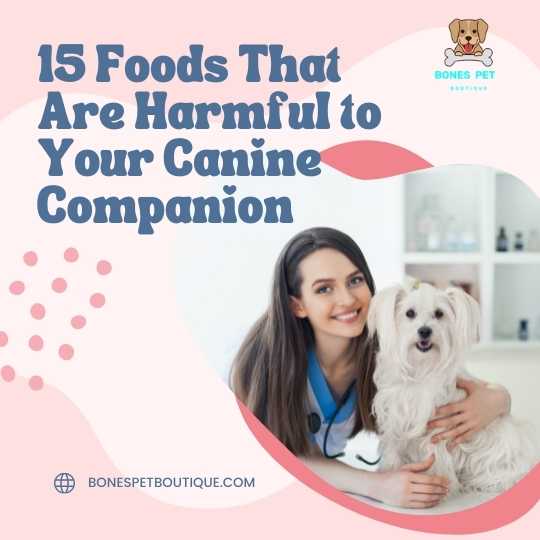15 Foods That Are Harmful to Your Pet
When you live with your furry children, it only makes it natural that you would want to share the food that you eat with them as well. Unfortunately, because people and dogs metabolize food in different ways, many of the items we eat are harmful to our pets. Moreover, when we say “bad,” we don’t only mean the type of evil that leads animals to gain weight over time; we also mean the type of evil that takes them to the emergency veterinarian. Don’t be concerned. There are some common meals that you should avoid giving to your dogs, which we’ve gathered here. So maintain your composure, avoid those puppy dog stares, and continue reading.

- Onions , and chives
irritate the stomach and contain substances that can kill a dog’s red blood cells, resulting in hemolytic anemia. Anemia is characterized by symptoms such as pale gums, weakness, an accelerated heart rate, and collapse, which might manifest themselves over several days. As a result, if you believe that your dog has consumed some, keep an eye on them for a few days. - Chocolates and cocoa powder
Contain theobromine and caffeine, which are stimulants that can cause your pup to become severely unwell and, in difficult situations, even cause death if consumed in large quantities. - Grapes and raisins
induce rapid kidney failure in dogs, which results in their death. - Nuts, such as almonds, macadamia nuts, pecans, and walnuts
Even in modest doses, macadamia nuts, which are members of the Proteaceae family, can cause vomiting, hyperthermia, fatigue, muscle weakness, and harm to the nervous system, according to the American Academy of Pediatrics. Almonds, on the other hand, are difficult for dogs to digest and might result in vomiting and diarrhea in some cases. Nuts also contain large levels of oil and fat, which may contribute to the development of pancreatitis.
- Dogs can develop pancreatitis as a result of eating fatty trimmings or fatty food in general (such as bacon).
- Xylitol is a synthetic sweetener that can be found in gums and sweets. It causes insulin levels to surge, which can result in liver failure, seizures, and even brain damage in your dog.
- Because of the caffeine concentration in coffee and tea, dogs may be at risk of drinking them. Even little doses of caffeine can produce severe side effects such as seizures, lung failure, and arrhythmia, which can ultimately result in death if not treated immediately. According to the American Veterinary Medical Association, “methylxanthines can cause vomiting and diarrhea, panting, excessive thirst and urine, hyperactivity, irregular heart rhythm, tremors, seizures, and even death” in pets who consume them.
- Large urine and thirst caused by salty snacks/junk food: Chips, French fries, and other fatty snacks seasoned with salt, as well as other heavy snacks, can lead dogs to drink excessive amounts of water and urinate excessively.
- Alcohol — Of course, no responsible dog parent would ever provide their dog with alcohol.
But, just in case, here’s a warning from the American Society of Animal Control: “The consumption of alcohol by your pet should be avoided at all costs. When it comes to your dog’s liver and brain, alcohol has the same effect as it does on a human’s, but it only takes a small amount to cause significant harm.”
- . Cinnamon in baked goods can result in diarrhea and vomiting, as well as an increased or lowered heart rate and even liver illness. So, yes, maybe think carefully before sharing that Cinnabon with your canine companion.
Dogs have diarrhea, vomiting, and heart congestion as a result of the person found in avocados. 11. The compound persin can also be found in the leaves and bark of avocado plants, so if you have one of these plants at home, make sure to keep it away from your dog.
- In dogs, the pits of persimmon, peach, or plum fruits might induce intestinal obstruction. Furthermore, the pits of peaches and plums contain cyanide.
- Raw yeast dough
When dogs consume raw yeast dough, the dough expands in their stomachs, causing bloating and pain, as well as an intestine rupture in severe cases. - Human pharmaceuticals such as nonsteroidal anti-inflammatory drugs (NSAIDs), acetaminophen, antidepressants, benzodiazepines and other sleep aids, and birth control pills are harmful to dogs.
Despite the fact that they are not technically food, popular drugs can cause major health problems in your dogs if they are unintentionally consumed. - Apple seeds: Apple seeds, like peach and plum pits, contain a chemical that, when digested, releases small amounts of cyanide into the bloodstream.
If you have reason to believe that your pet has consumed any of these foods, make a note of the food/substance and the amount ingested before contacting a veterinarian.
